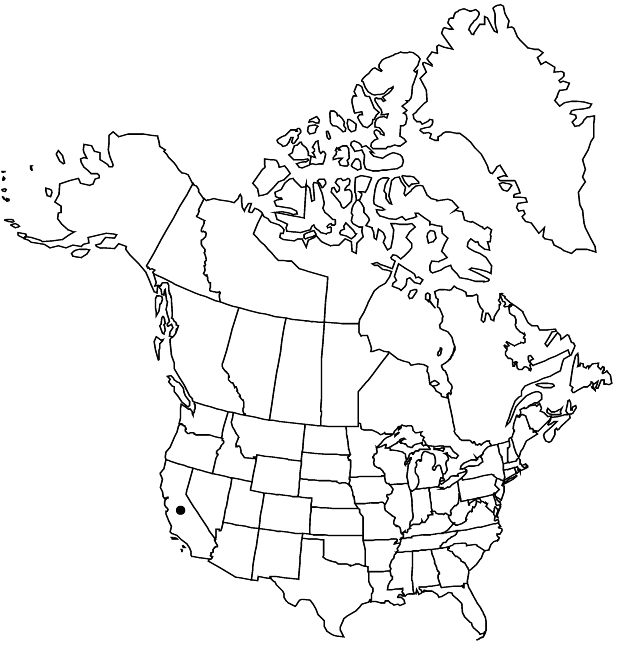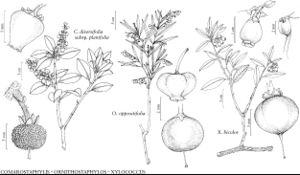Difference between revisions of "Xylococcus bicolor"
Trans. Amer. Philos. Soc., n. s. 8: 259. 1842 ,.
Common names: Mission manzanita
Illustrated
Synonyms: Arctostaphylos bicolor (Nuttall) A. Gray
Treatment appears in FNA Volume 8. Treatment on page 404.
FNA>Volume Importer |
imported>Volume Importer |
||
| (6 intermediate revisions by 2 users not shown) | |||
| Line 7: | Line 7: | ||
}} | }} | ||
|common_names=Mission manzanita | |common_names=Mission manzanita | ||
| + | |special_status={{Treatment/ID/Special_status | ||
| + | |code=F | ||
| + | |label=Illustrated | ||
| + | }} | ||
|basionyms= | |basionyms= | ||
|synonyms={{Treatment/ID/Synonym | |synonyms={{Treatment/ID/Synonym | ||
|name=Arctostaphylos bicolor | |name=Arctostaphylos bicolor | ||
|authority=(Nuttall) A. Gray | |authority=(Nuttall) A. Gray | ||
| + | |rank=species | ||
}} | }} | ||
|hierarchy=Ericaceae;Ericaceae subfam. Arbutoideae;Xylococcus;Xylococcus bicolor | |hierarchy=Ericaceae;Ericaceae subfam. Arbutoideae;Xylococcus;Xylococcus bicolor | ||
| Line 26: | Line 31: | ||
|elevation=0-700 m | |elevation=0-700 m | ||
|distribution=Calif.;Mexico (Baja California). | |distribution=Calif.;Mexico (Baja California). | ||
| − | |discussion=<p>Xylococcus bicolor has a limited distribution in southern California, occurring on the coastal plain and in the Peninsular and Transverse ranges of Los Angeles County to San Diego County, and on Santa Catalina Island.</p> | + | |discussion=<p><i>Xylococcus bicolor</i> has a limited distribution in southern California, occurring on the coastal plain and in the Peninsular and Transverse ranges of Los Angeles County to San Diego County, and on Santa Catalina Island.</p> |
|tables= | |tables= | ||
|references= | |references= | ||
| Line 35: | Line 40: | ||
-->{{#Taxon: | -->{{#Taxon: | ||
name=Xylococcus bicolor | name=Xylococcus bicolor | ||
| − | |||
|authority=Nuttall | |authority=Nuttall | ||
|rank=species | |rank=species | ||
| Line 49: | Line 53: | ||
|publication title=Trans. Amer. Philos. Soc., n. s. | |publication title=Trans. Amer. Philos. Soc., n. s. | ||
|publication year= | |publication year= | ||
| − | |special status= | + | |special status=Illustrated |
| − | |source xml=https:// | + | |source xml=https://bitbucket.org/aafc-mbb/fna-data-curation/src/2e0870ddd59836b60bcf96646a41e87ea5a5943a/coarse_grained_fna_xml/V8/V8_762.xml |
|subfamily=Ericaceae subfam. Arbutoideae | |subfamily=Ericaceae subfam. Arbutoideae | ||
|genus=Xylococcus | |genus=Xylococcus | ||
Latest revision as of 22:46, 5 November 2020
Plants 1.5–4(–7) m. Leaves: petiole 0.5–1 mm; blade dark green adaxially, 1.8–5.5 × 0.8–2.3 cm, base cuneate, apex acute. Inflorescences recurved, unbranched. Flowers: sepals dark red, tomentose, lobes reflexed; corolla 7–9 mm; nectary disc crateriform; style elongate; stigma minute. Drupes 5–8 × 6–10 mm. Seeds ovoid. 2n = 26.
Phenology: Flowering Dec–Jul.
Habitat: Chaparral, dry slopes
Elevation: 0-700 m
Distribution

Calif., Mexico (Baja California).
Discussion
Xylococcus bicolor has a limited distribution in southern California, occurring on the coastal plain and in the Peninsular and Transverse ranges of Los Angeles County to San Diego County, and on Santa Catalina Island.
Selected References
None.
Lower Taxa
None.
